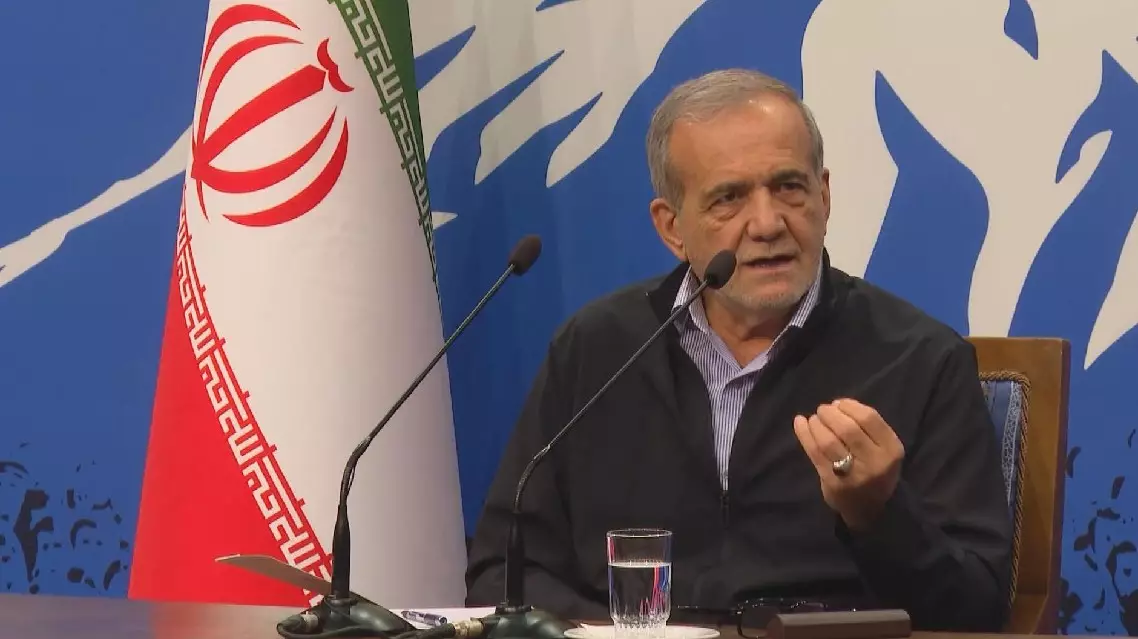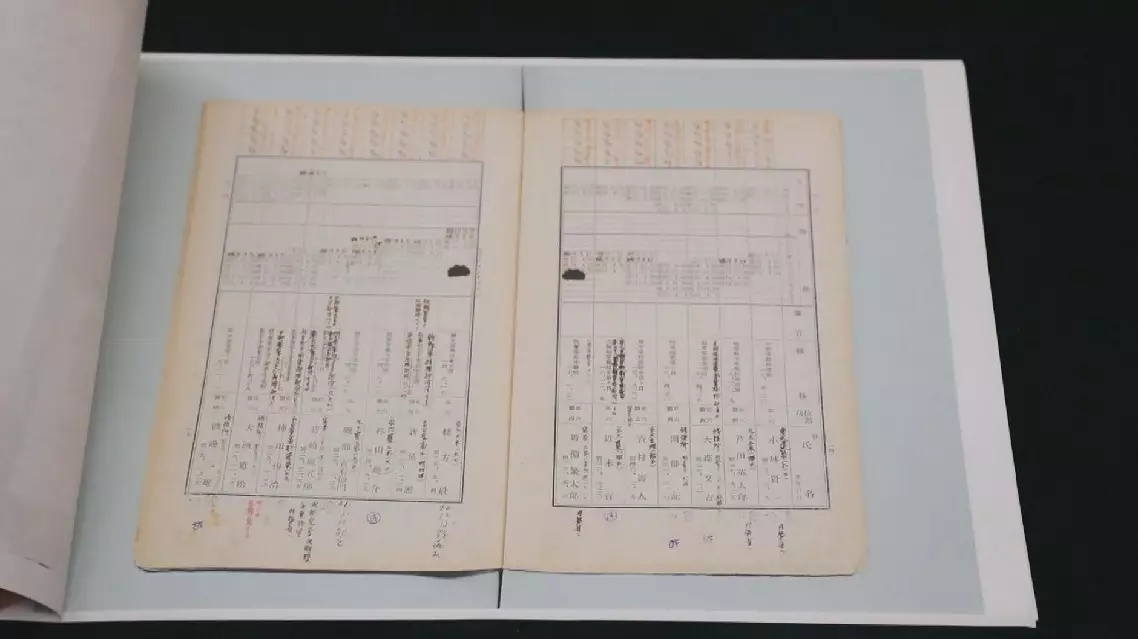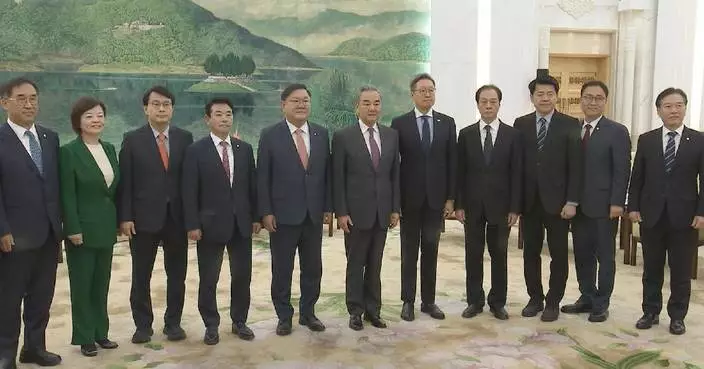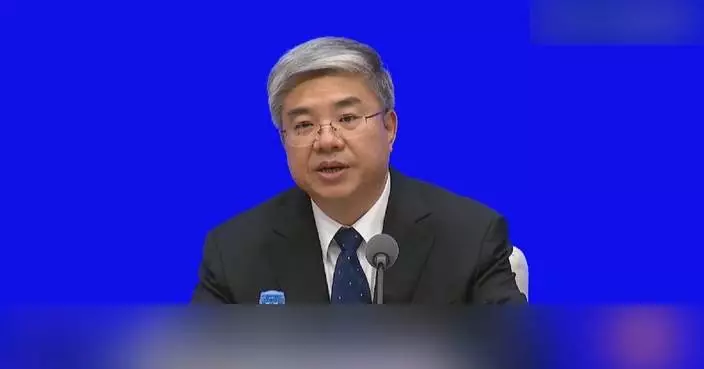Iran is willing to keep strengthening bilateral relations and enhancing cooperation with China, President Masoud Pezeshkian told reporters on Monday in the capital Tehran.
Pezeshkian made the remarks during his first news conference since taking office in late July.
Iran was admitted to the Shanghai Cooperation Organization (SCO) as a member state in 2023 and has achieved full membership in the BRICS group from January 1, 2024.
When asked how he views the prospect of China-Iran relations, Pezeshkian hailed China's successful mediation that led to the reconciliation between Iran and Saudi Arabia while eying deeper bilateral cooperation with China.
"Iran has always maintained good relations with China. Chinese mediation to resolve Iran-Saudi disputes marks a big step towards regional harmony. Iran is a comprehensive strategic partner of China. We will work to strengthen [bilateral relations] and implement relevant agreements. We hope to advance that cooperation," he said.
When it comes to tensions in the Middle East, Pezeshkian accused Israel of trying to drag Iran into the conflict and undermining regional peace by assassinating former Hamas political leader Ismail Haniyeh in Tehran. Iran has remained restrained but reserves the right to self-defense under specific conditions, he stressed.
The Iranian president also condemned Israel for committing war crimes and genocide against Palestinians, urging the international community to condemn and stop these actions.
On relations with the United States, Pezeshkian noted that Iran seeks peace instead of war, and has no plans to develop nuclear weapons. However, the United States has torn up the 2015 nuclear deal, formally known as the Joint Comprehensive Plan of Action (JCPOA) and imposed comprehensive sanctions against Iran.
The improvement of U.S.-Iran relations depends on whether the United States will remove its hostility towards Iran and lift the sanctions, he said.
He called on countries in the region to strengthen solidarity, bridge differences, and stop the crimes committed by Israel. Iran stands ready to continue enhancing cooperation with friendly countries such as China within the framework of multilateralism to achieve win-win results, said Pezeshkian.

Iran stands ready to strengthen bilateral ties with China: president
Japanese Army Unit 731, a biological and chemical warfare unit stationed in northeast China during World War II, had a strict evaluation and assessment system for technicians, allowing those who conducted live human experiments to be promoted, according to a newly discovered document of the notorious unit.
The new document was disclosed by Japanese scholar Seiya Matsuno, a specially-appointed professor at Heilongjiang International University, in September ahead of the 93rd anniversary of the September 18 Incident of 1931. The archive is important evidence for deepening the research on Japan's bacterial warfare system and is of great significance to fully exposing Japan's biological warfare crimes.
The September 18 Incident of 1931 taking place in the city of Shenyang in northeast China was a precursor to Japan’s launch of a full-scale invasion of China, and a key event ahead of the outbreak of World War Two in Asia.
The new files include the evaluation forms of Unit 731 technicians. On these forms, red words such as "excellent" and "good" are marked. For example, Yoshimura Hisato,a war criminal and leader of the unit’s frostbite study squad, has four "excellent" and one "good" ratings. During this period, Hisato compiled the relevant content of the experiments conducted in Unit 731 into a paper and published it in Japan.
"This paper is a confidential document written by Yoshimura Hisato, a technician with Unit 731, about frostbite. It was published on October 26, 1941. There is a table called Experiment 5, which contains the frostbite resistance index of people under various living conditions. The subjects are marked with ABCDE, and then the data of frostbite resistance indexes are counted under various living conditions, such as soaking in cold water, soaking in warm water, fasting for two days, fasting for three days, and the subjects staying awake day and night. Such data obtained through live human experiments can be seen everywhere in the paper," said Tan Tian, researcher at the exhibition hall of evidence of crimes of Unit 731 in Harbin, northeast China's Heilongjiang Province.
According to staff from the International Research Center of Unit 731 under the Harbin Academy of Social Sciences, Hisato joined Unit 731 in March 1938 as a sixth-class technician. While conducting frostbite research and experiments, he was also responsible for the management of the special prison where the subjects were detained, making him a researcher as well as a core secrets administrator of the of Unit 731. He was promoted to the rank of fourth-class technician in October 1942.
"From the perspective of Yoshimura Hisato, he joined Unit 731 in 1938 and completed a three-step career jump in less than four years until 1942. Lying behind such fruitful achievements were the bloody live human experiments he made. Yoshimura Hisato published at least 200 medical papers in his career. The Japanese medical community tacitly approved the anti-human atrocities and human experiments of Unit 731, which further reflects the organized nature of these crimes," said Gong Wenjing, director of the International Research Center of Unit 731 under Harbin Academy of Social Sciences.
Unit 731 was a covert biological and chemical warfare research and development unit of the Imperial Japanese Army that engaged in lethal human experimentation and biological weapons manufacturing in China during World War II. The unit is estimated to have killed between 200,000 and 300,000 people. It was based in the Pingfang District of Harbin, the largest city in the Japanese puppet state of Manchukuo (now Northeast China, formerly named Manchuria) and had active branch offices throughout China and Southeast Asia.
Unit 731 was responsible for some of the most notorious war crimes committed by the Japanese aggressor troops. It routinely conducted tests on people who were dehumanized and internally referred to as "logs". Experiments included disease injections, controlled dehydration, biological weapons testing, hypobaric pressure chamber testing, vivisection, organ procurement, amputation, and standard weapons testing. Victims included not only kidnapped men, women (including pregnant women) and children but also babies born from the systemic rape perpetrated by the staff inside the compound.

Newly discovered document exposes evaluation system of technicians under wartime Japan's germ warfare unit










